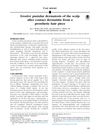 2 citations,
September 2021 in “Journal of Pharmacopuncture”
2 citations,
September 2021 in “Journal of Pharmacopuncture” Korean medicine may help with hair growth in alopecia, but more research is needed to confirm this.
1 citations,
February 2024 in “Cosmetics” Cannabidiol shows promise as an effective treatment for acne.
 1 citations,
July 2023 in “Journal of Clinical Medicine”
1 citations,
July 2023 in “Journal of Clinical Medicine” Different causes of beard hair loss have various treatments, including medications, lifestyle changes, and procedures to stimulate hair growth.
 1 citations,
March 2023 in “Phytochemistry Reviews”
1 citations,
March 2023 in “Phytochemistry Reviews” CBD may improve skin and hair health, but its effective use and safety need more research.
 1 citations,
March 2023 in “Clinical, Cosmetic and Investigational Dermatology”
1 citations,
March 2023 in “Clinical, Cosmetic and Investigational Dermatology” Current treatments for Alopecia Areata have mixed success, and there's a need for better, more accessible options and support for affected individuals.
 May 2024 in “Dermatologic therapy”
May 2024 in “Dermatologic therapy” AKN is a chronic scalp condition in African-descended males, treated with topicals, antibiotics, steroids, and sometimes surgery or laser.
 October 2023 in “Biomaterials”
October 2023 in “Biomaterials” Nanotechnology could improve hair regrowth but faces challenges like complexity and safety concerns.
 May 2023 in “Australasian Journal of Dermatology”
May 2023 in “Australasian Journal of Dermatology” Various substances, including cosmetic sponges, vein glue, chai tea, skincare products, and medicaments, can cause allergic contact dermatitis, and healthcare workers often react to N95 masks.
 September 2022 in “Polish Hyperbaric Research”
September 2022 in “Polish Hyperbaric Research” Some treatments for hair loss, like finasteride, biotin, and minoxidil, can be effective, but their success varies by individual case.
January 2023 in “Pharmaceutics” AA–TF#15 significantly promotes hair regrowth and could be an effective treatment for androgenic alopecia.
 22 citations,
December 2013 in “Molecular biology of the cell”
22 citations,
December 2013 in “Molecular biology of the cell” ILK is essential for proper hair follicle development and structure.
 21 citations,
May 1996 in “Current problems in dermatology”
21 citations,
May 1996 in “Current problems in dermatology” Detailed patient history and physical exams are crucial for diagnosing hair loss.
 15 citations,
June 2006 in “Journal of Plastic Reconstructive and Aesthetic Surgery”
15 citations,
June 2006 in “Journal of Plastic Reconstructive and Aesthetic Surgery” FUT effectively treats male-pattern hair loss with high satisfaction.
 5 citations,
November 2019 in “Dermatology and therapy”
5 citations,
November 2019 in “Dermatology and therapy” Beard hair extraction improves scalp hair restoration results in East Asian men with severe hair loss.
January 2023 in “Odisha Journal of Psychiatry” Thorough patient interviews are crucial to identify self-inflicted hair loss.
 1 citations,
May 2015 in “Dermatologic Therapy”
1 citations,
May 2015 in “Dermatologic Therapy” The microstrip technique for hair transplantation is effective and discreet for patients needing fewer than 1500 grafts.
23 citations,
November 2007 in “Journal of cutaneous medicine and surgery” Topical tacrolimus effectively treated scalp lesions, reversed skin atrophy, and promoted hair growth.
 28 citations,
August 2013 in “Facial Plastic Surgery Clinics of North America”
28 citations,
August 2013 in “Facial Plastic Surgery Clinics of North America” Body and beard hair can be used for hair restoration in severely bald patients, but the technique is complex and costly.
 5 citations,
July 2006 in “Contact dermatitis”
5 citations,
July 2006 in “Contact dermatitis” Ammonium bisulfite in hair bleach can cause facial eczema.
 September 2023 in “Cureus”
September 2023 in “Cureus” Topical antibiotics successfully treated a rare scalp condition in an elderly man with vitiligo.
 9 citations,
March 2017 in “JAAD Case Reports”
9 citations,
March 2017 in “JAAD Case Reports” A woman's scalp condition improved with specific ointment after a hair piece caused skin issues.
 9 citations,
February 2011 in “Biologics: Targets & Therapy”
9 citations,
February 2011 in “Biologics: Targets & Therapy” Topical calcineurin inhibitors, especially 0.1% tacrolimus ointment, are effective and well-tolerated for treating cutaneous lupus erythematosus but require more research for standard treatment guidelines.
 20 citations,
January 2000 in “Dermatologic Clinics”
20 citations,
January 2000 in “Dermatologic Clinics” New psoriasis treatments are effective but come with side effects and risks.
 74 citations,
September 1980 in “Medical Clinics of North America”
74 citations,
September 1980 in “Medical Clinics of North America” Toxic epidermal necrolysis is a severe skin condition often caused by drugs, with complex treatment and a high risk of death, but survivors usually heal without scars.
 48 citations,
November 1992 in “International Journal of Dermatology”
48 citations,
November 1992 in “International Journal of Dermatology” Toxic epidermal necrolysis is a severe skin reaction often linked to drugs, requiring careful medication use and supportive care.
 47 citations,
December 2020 in “Journal of the European Academy of Dermatology and Venereology”
47 citations,
December 2020 in “Journal of the European Academy of Dermatology and Venereology” The document concludes that understanding and treating hair loss requires recognizing its various types and using appropriate diagnostic tools and treatments.
 37 citations,
August 2013 in “Facial Plastic Surgery Clinics of North America”
37 citations,
August 2013 in “Facial Plastic Surgery Clinics of North America” Facial hair restoration is generally successful and satisfying for patients when done with quality techniques and realistic expectations.
 8 citations,
January 2020 in “Plastic and Aesthetic Nursing”
8 citations,
January 2020 in “Plastic and Aesthetic Nursing” The article concludes that different types of hair loss require specific treatments and psychological support is important.
 4 citations,
January 1987 in “Annual reports in medicinal chemistry”
4 citations,
January 1987 in “Annual reports in medicinal chemistry” New treatments for skin diseases are more effective and patient-friendly, but many still lack a cure.
 January 2012 in “Springer eBooks”
January 2012 in “Springer eBooks” Lupus can cause different skin problems, and treatments like quitting smoking and using certain creams or medicines can help.


























